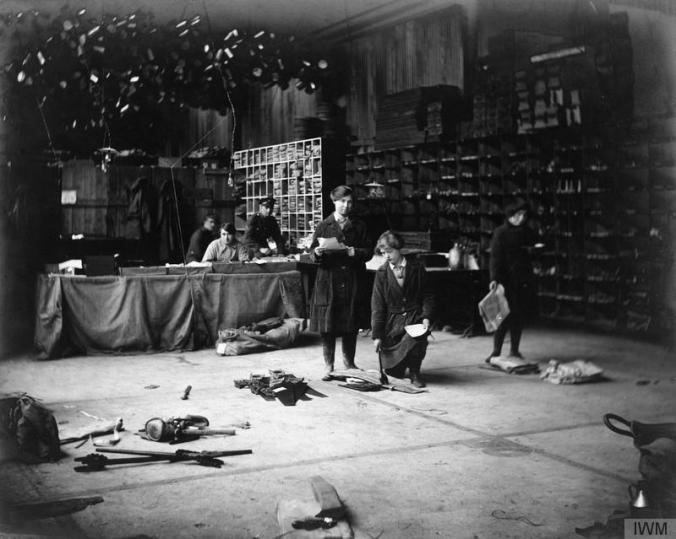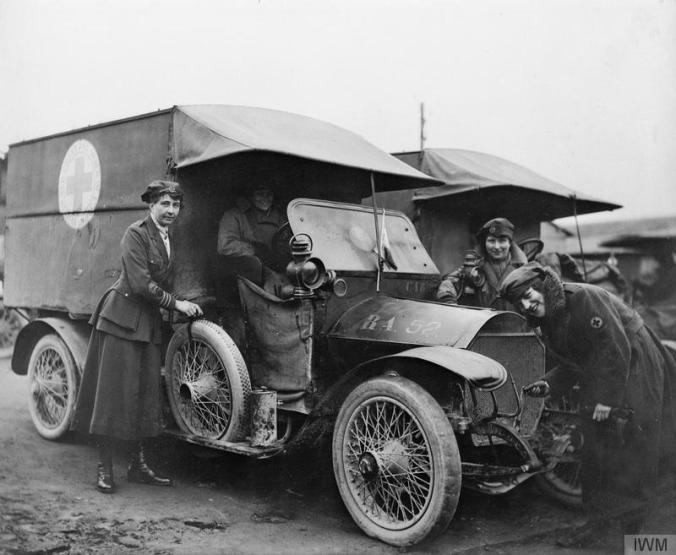On Monday March 3rd 1919, Edis and her companions set off from Boulogne, travelled through Calais, and ended the day in Dunkirk. After a shaky start, with the driver initially refusing to take the camera equipment and their luggage, they set off for Calais. Lady Norman volunteered to send her suitcase back from the next stopping place, “so our car was lightened and the temper of the chauffeur ameliorated.”
(I should point out that these posts represent a very much abridged version of Edis’ journal. We hope to be able to have the full account available to browse in the gallery here at Cromer as part of our new displays next year.)
Our first visit was to a camp of the First Aid Nursing Yeomanry, known as the Fanys. A very jolly type of good class English girl they were – some of a decidedly sporting and masculine stamp – but so fresh and healthy and attractive. I took a small group on a car, including “Boss” – Miss Franklin.
After some time we set off for a camp of the Queen Mary’s Auxiliary Army Corps, beyond Calais. We were shown all round the camp, Miss Froude, the Deputy Controller of the WAACs for Calais district, accompanying us. She told us thrilling stories of evacuating a camp in the night, she leading in the darkness with a single torch, five hundred of the girls following her through mud and difficulty. One wanted to hear much more of her stories.
After this we visited the largest Ordnance Depot in France. The women helped in the distribution work. Then photographed in the tool department and in the clothing hangar, both enormous and well-lighted places.

Members of the Queen Mary’s Army Auxiliary Corps in the tool distributing store of a British Army ordnance depot at Vendroux (IWM)
We were much later than intended, and Lady Norman decided that we should spend the night at Dunkerke instead of going on to Ostend. The country was little populated and we went through long stretches without houses or villages. we saw a few buildings destroyed by bombs, but I heard terrible stories of the constant air-raids both on Boulogne and Calais – night after night. The WAACs had to go into dug-outs on these occasions, and to be on duty as usual, whatever the night had been.
Lady Norman talked to us of the days when she was out running her hospital at Wimereux, and everyone so busy that they saw nothing of any unit but their own. But she used to drive her own car and so slip out to see a good deal more than most people, and had come through terrible times during raids. I was amused to learn that when she sent her superfluous luggage back from the FANY camp [earlier that day], she had retained little but her pistol and a parcel of influenza preventatives which her husband had made her vow never to part from.
Tomorrow the group cross the border to Belgium, and enter “no man’s land”.

With the 1918 flu pandemic fresh in people’s minds I’m not surprised that Lady Norman’s husband didn’t want her parted from her influenza preventatives!
LikeLike
Absolutely! Edis mentions influenza several times over the course of the journal and there are a worrying few days where she loses her voice and is really quite unwell herself!
LikeLike